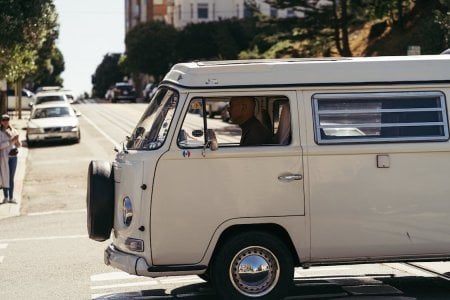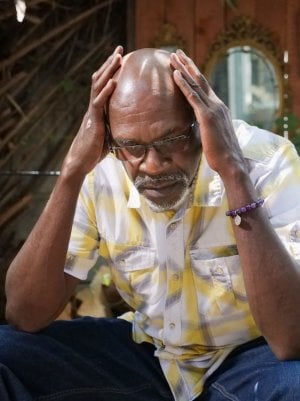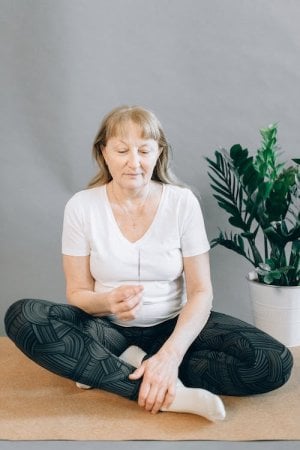Driving with dignity: New safety test in the works for people with dementia
- Replies 2
Driving is an essential part of our lives and for many, an integral part of our independence.
But for some Australians living with dementia, this freedom can be taken away in an instant after an abrupt diagnosis.
John Quinn, 71, knows this all too well.
He was diagnosed with younger-onset dementia when he was 59. However, his partner Glenys Petrie says she had noticed something was off with John’s driving before the medical verdict came.
‘He would stop in the middle of the motorway and there'd be no traffic there and I'd say “What's going on?”, and he'd say “I have to give way to the right",’ she said.
‘We had too many close calls to the point where I refused to be a passenger in the car.’
‘I said “If we need to go somewhere, I'll be driving.”’
According to Dementia Australia, dementia is not one disease. Rather, it is a classification of many diseases affecting brain function such as Alzheimer’s disease or Lewy Body disease that have symptoms like memory loss and difficulty with everyday tasks.

After the dementia diagnosis, John, a Queensland native, informed the state’s Department of Transport of his condition.
‘I started to have enough insight to realise that things were becoming a little more difficult and at that point, my GP started to insist that I go for a test, a driving test,’ he said.
People with dementia are required by law to inform their state or territory’s road and traffic body of their diagnosis. After this, their doctor assesses their mental fitness to stay on Aussie roads.
John passed with flying colours, but in the end, he decided against continuing to drive.
‘In the end, I thought to myself, “Well, I don't drive much anyhow, so what's the sense in continuing to drive?”’ he said.
‘So, we went down to the Department of Transport and I surrendered my driver's licence.’
John has since opted to use a bicycle as his means of transport, and he has no regrets.
‘I'd sometimes ride my bike over to a friend's place and then together we'd get in his car and we'd drive over to Chandler where we'd go swimming.’

But Glenys couldn’t help but feel sorry for other cases they know of that had less pleasant outcomes.
‘We know too many people who lost their licence the day of their diagnosis and their career,’ she said
‘They were truck drivers or drivers and so in one day they lost their career, their ability to pay their mortgage.’
‘It's a complex issue — driving is a complex task and dementia is a complex issue, but everyone needs to be treated individually and respectfully.’
‘What we need is to put mechanisms in place so the transition from being able to drive, to not being able to drive, is done in a respectful way,’ John added.
Enter Dr Theresa Scott from the University of Queensland, whose team is hard at work developing a revolutionary way of testing dementia patients’ capacities to drive and assess hazards on Australia's roads through the use of real videos.
‘What the test aims to do is to test that person's ability to predict a traffic incident, so to predict a hazard for example,’ she said.
The video safety test aims to address existing gaps in the assessment of people with dementia, which includes putting doctors in the ‘very difficult’ position of policing driver safety with their patients, as well as the emotional costs of affected persons being told they are unfit to drive.
‘If someone is told that they can't drive while they are potentially still safe to drive, that has a significant impact on people's emotional responses,’ Scott pointed out.

In some cases, persons with dementia aren’t even given the chance to test, or are simply given a pen-and-paper memory test, before their licence is revoked, according to Dr Scott.
She hopes that, if successful, her team’s driving test proves to be a more fair and objective way that those with dementia can be assessed for fitness to drive.
‘It means that people can continue to drive while they're safe, they can be tested by their GP and their GP will feel confident to say if they can continue to drive.’
And as John and Glenys raised, Dr Scott also says the video safety test can ease what can be a stressful transition for people with dementia.
‘Accepting that decision from your health professional to stop driving is very important in them moving forward and finding other ways to get to their community,’ she said.
Dr Scott’s research at the University of Queensland has been awarded a $1.3 million grant from the federal government.
The video safety tests are expected to be used by health professionals by 2025.
As of 2022, there are an estimated 487,500 Aussies with dementia, and this figure is expected to bloat to over 1 million by 2058 pending any medical breakthroughs according to Dementia Australia.
In addition, around 28,000 Aussies are estimated to have younger-onset dementia, which can occur in people as young as their 30s.
There are several risk factors for the disease, which include those beyond our control like age and family history.
However, there are those which we can do something about, such as diet, exercise, and environment that we can keep in mind to keep our minds healthy and sharp.

There are also resources for those with dementia as well as their family members. The National Dementia Helpline can be reached by phone at 1800 100 500 for round the clock support for those in need in relation to the disease.
If you have time, you might want to read related stories we have, including why nose-picking and how fast you walk could tell you more about your risk for developing dementia.

What do you think of this idea underway at the University of Queensland care of Dr Scott and her team? Is it something that would be of great use, in your opinion?
Share your thoughts with us below!
Source: YouTube/Dementia Australia
But for some Australians living with dementia, this freedom can be taken away in an instant after an abrupt diagnosis.
John Quinn, 71, knows this all too well.
He was diagnosed with younger-onset dementia when he was 59. However, his partner Glenys Petrie says she had noticed something was off with John’s driving before the medical verdict came.
‘He would stop in the middle of the motorway and there'd be no traffic there and I'd say “What's going on?”, and he'd say “I have to give way to the right",’ she said.
‘We had too many close calls to the point where I refused to be a passenger in the car.’
‘I said “If we need to go somewhere, I'll be driving.”’
According to Dementia Australia, dementia is not one disease. Rather, it is a classification of many diseases affecting brain function such as Alzheimer’s disease or Lewy Body disease that have symptoms like memory loss and difficulty with everyday tasks.

Glenys noticed odd things about John’s driving before his diagnosis with dementia. Stock Image Credit: Pexels/Ricardo Esquivel
After the dementia diagnosis, John, a Queensland native, informed the state’s Department of Transport of his condition.
‘I started to have enough insight to realise that things were becoming a little more difficult and at that point, my GP started to insist that I go for a test, a driving test,’ he said.
People with dementia are required by law to inform their state or territory’s road and traffic body of their diagnosis. After this, their doctor assesses their mental fitness to stay on Aussie roads.
John passed with flying colours, but in the end, he decided against continuing to drive.
‘In the end, I thought to myself, “Well, I don't drive much anyhow, so what's the sense in continuing to drive?”’ he said.
‘So, we went down to the Department of Transport and I surrendered my driver's licence.’
John has since opted to use a bicycle as his means of transport, and he has no regrets.
‘I'd sometimes ride my bike over to a friend's place and then together we'd get in his car and we'd drive over to Chandler where we'd go swimming.’

John voluntarily surrendered his driver's licence and instead opted to use a bike as his means of transport. Stock Image Credit: Pexels/Philipp M
But Glenys couldn’t help but feel sorry for other cases they know of that had less pleasant outcomes.
‘We know too many people who lost their licence the day of their diagnosis and their career,’ she said
‘They were truck drivers or drivers and so in one day they lost their career, their ability to pay their mortgage.’
‘It's a complex issue — driving is a complex task and dementia is a complex issue, but everyone needs to be treated individually and respectfully.’
‘What we need is to put mechanisms in place so the transition from being able to drive, to not being able to drive, is done in a respectful way,’ John added.
Enter Dr Theresa Scott from the University of Queensland, whose team is hard at work developing a revolutionary way of testing dementia patients’ capacities to drive and assess hazards on Australia's roads through the use of real videos.
‘What the test aims to do is to test that person's ability to predict a traffic incident, so to predict a hazard for example,’ she said.
The video safety test aims to address existing gaps in the assessment of people with dementia, which includes putting doctors in the ‘very difficult’ position of policing driver safety with their patients, as well as the emotional costs of affected persons being told they are unfit to drive.
‘If someone is told that they can't drive while they are potentially still safe to drive, that has a significant impact on people's emotional responses,’ Scott pointed out.

John, Glenys, and Dr Scott all recognise the emotional toll associated with a dementia diagnosis and being assessed for mental fitness to drive. Stock Image Credit: Pexels/Kindel Media
In some cases, persons with dementia aren’t even given the chance to test, or are simply given a pen-and-paper memory test, before their licence is revoked, according to Dr Scott.
She hopes that, if successful, her team’s driving test proves to be a more fair and objective way that those with dementia can be assessed for fitness to drive.
‘It means that people can continue to drive while they're safe, they can be tested by their GP and their GP will feel confident to say if they can continue to drive.’
And as John and Glenys raised, Dr Scott also says the video safety test can ease what can be a stressful transition for people with dementia.
‘Accepting that decision from your health professional to stop driving is very important in them moving forward and finding other ways to get to their community,’ she said.
Dr Scott’s research at the University of Queensland has been awarded a $1.3 million grant from the federal government.
The video safety tests are expected to be used by health professionals by 2025.
As of 2022, there are an estimated 487,500 Aussies with dementia, and this figure is expected to bloat to over 1 million by 2058 pending any medical breakthroughs according to Dementia Australia.
In addition, around 28,000 Aussies are estimated to have younger-onset dementia, which can occur in people as young as their 30s.
There are several risk factors for the disease, which include those beyond our control like age and family history.
However, there are those which we can do something about, such as diet, exercise, and environment that we can keep in mind to keep our minds healthy and sharp.

Maintaining an active lifestyle goes a long way as far as lowering the risk of dementia is concerned. Stock Image Credit: Pexels/Nataliya Vaitkevich
There are also resources for those with dementia as well as their family members. The National Dementia Helpline can be reached by phone at 1800 100 500 for round the clock support for those in need in relation to the disease.
If you have time, you might want to read related stories we have, including why nose-picking and how fast you walk could tell you more about your risk for developing dementia.
Key Takeaways
- Researchers at the University of Queensland are working on a video road safety test.
- The test can help address many problems with the current setup for drivers diagnosed with dementia where those who still may be fit to drive are forced to give up their driver's licences due to their conditions.
- The effort has received over a million dollars in funding from the government, and it is expected that health professionals can use the test in a few years' time.
Share your thoughts with us below!
Source: YouTube/Dementia Australia







